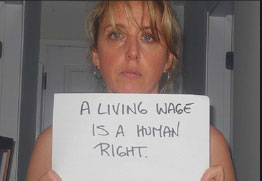By HtH Newsletter Editor Katie McCaskey
 I recently ended a high school friendship over a debate about living wages. To my surprise the discussion quickly became heated, and then personal. Why is this idea of a living wage so frightening to some people?
I recently ended a high school friendship over a debate about living wages. To my surprise the discussion quickly became heated, and then personal. Why is this idea of a living wage so frightening to some people?
It can be difficult to understand the vitriol directed at the idea of raising the minimum wage to provide living wage — one that, at minimum, covers the cost of local housing. Those of us fighting homelessness in our communities intuitively know that homelessness is tied to the availability of jobs and the affordability of local housing. Now, major research is proving it — and it’s front and center in President Obama’s recent State of the Union address.
Even The Economist, the storied English publication our HtH contributor Steve O’Keefe describes as “the house organ of the economics profession, the gold standard of consensus among economists,” has published research that shows that increasing the minimum wage benefits everyone.
Still, the bitter debates continue.
Just last week, HtH’s Founder Richard R. Troxell weighed in on a post at Forbes titled, “Minimum Wage: More Baloney.”
Writes Troxell, “Mr. Dunkelburg is correct in that study after study has shown that increased wages to minimum wage workers have been spent right back into the economy. What he does not realize is that due to businesses paying less than living wages since the 1980s, over 1,000,000 minimum-wage workers now needlessly comprise a portion of 3.5 million people experiencing homelessness in this nation.”
So, why exactly is the idea of a living wage so frightening to people? It comes down to some common misconceptions. Major misconceptions include:
MYTH: If workers are paid more prices will automatically rise.
This fear is based on a scarcity mentality. The idea is that if you give more to someone else there will not be enough left for you. Why should you pay more for Peet’s Coffee, for example, the thinking goes, if the company decides to improve the lives of their workers? Won’t you be forced to drink less coffee?
In fact, more employers are seeing the benefits of a stable workforce — without automatically raising prices for consumers. As Troxell explains in his rebuttal to the Forbes article,”businesses are setting themselves up to fail by paying less than a stabilizing wage.” Studies show that fair pay for workers does not automatically translate into higher prices for consumers. One study is “Think Again: A Wage and Price Survey of Denver Area Fast Food Restaurants.”
MYTH: Workers can refuse to work jobs that don’t pay well.
Many workers can’t afford to be choosy. That’s why we’ve got a national population of “employed” people who work two or more jobs and still sleep in their vehicles. It’s also why state programs experience a cash crisis every time employers like Wal-Mart come to town.
This and other realities are well documented in Troxell’s book, Looking Up At the Bottom Line: The Struggle for the Living Wage, as well as books like Nickel and Dimed: On (Not) Getting By in America by Barbara Ehrenreich. This shadow group of homeless people may not always be officially counted as homeless. But does it matter if they are experiencing the dangers, stresses, and stigmas associated with the condition?
MYTH: Homeless people are unwilling to work.
Not true. In Austin, for example, most people experiencing homelessness are unable to find work, at least ac-cording to the latest HtH survey. Sadly some are even discriminated against when it is revealed that they are homeless. Just ask this recent job applicant at KFC.
There are many more myths out there — what have you heard? How can those of us who support a living wage improve our educational outreach? How can we encourage more productive discussions?
Many of us believe that growing inequality and increasing homelessness are not in our best interest as a society. Thank you for your work helping to end homelessness in our lifetime.
Did you enjoy this article? Want to read more like it? Great news! The latest issue of the Challenger Newspaper is available for download here. Or for a hard-copy version see our distributors map to locate a friendly Challenger distributor near you. Thank you for helping support our mission to end homelessness in Austin!
